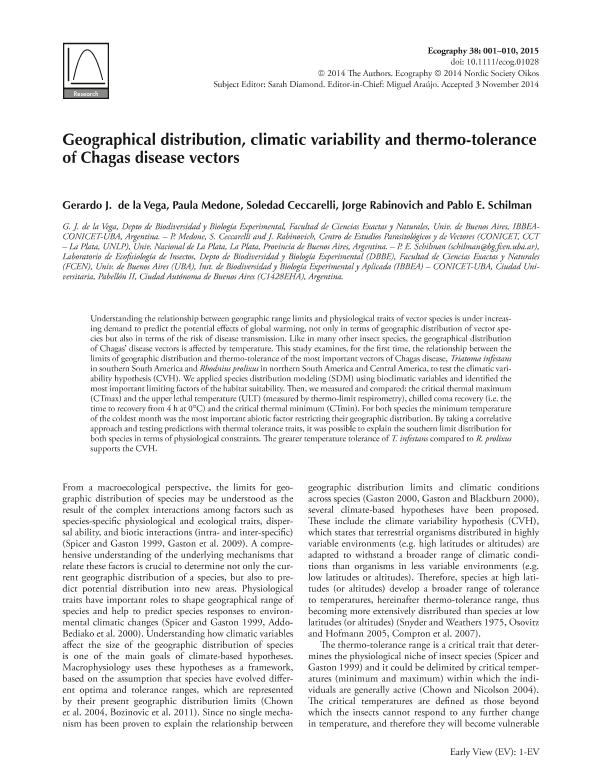Mostrar el registro sencillo del ítem
dc.contributor.author
de la Vega, Gerardo José

dc.contributor.author
Medone, Paula

dc.contributor.author
Ceccarelli, Soledad

dc.contributor.author
Rabinovich, Jorge Eduardo

dc.contributor.author
Schilman, Pablo Ernesto

dc.date.available
2017-01-06T19:29:46Z
dc.date.issued
2015-08
dc.identifier.citation
de la Vega, Gerardo José; Medone, Paula; Ceccarelli, Soledad; Rabinovich, Jorge Eduardo; Schilman, Pablo Ernesto; Geographical distribution, climatic variability and thermo-tolerance of Chagas disease vectors; Wiley; Ecography; 38; 8; 8-2015; 851–860
dc.identifier.issn
0906-7590
dc.identifier.uri
http://hdl.handle.net/11336/10941
dc.description.abstract
Understanding the relationship between geographic range limits and physiological traits of vector species is under increasing demand to predict the potential eff ects of global warming, not only in terms of geographic distribution of vector species but also in terms of the risk of disease transmission. Like in many other insect species, the geographical distribution of Chagas ’ disease vectors is aff ected by temperature. Th is study examines, for the fi rst time, the relationship between the limits of geographic distribution and thermo-tolerance of the most important vectors of Chagas disease, Triatoma infestans in southern South America and Rhodnius prolixus in northern South America and Central America, to test the climatic variability hypothesis (CVH). We applied species distribution modeling (SDM) using bioclimatic variables and identifi ed the most important limiting factors of the habitat suitability. Th en, we measured and compared: the critical thermal maximum (CTmax) and the upper lethal temperature (ULT) (measured by thermo-limit respirometry), chilled coma recovery (i.e. the time to recovery from 4 h at 0 ° C) and the critical thermal minimum (CTmin). For both species the minimum temperature of the coldest month was the most important abiotic factor restricting their geographic distribution. By taking a correlative approach and testing predictions with thermal tolerance traits, it was possible to explain the southern limit distribution for both species in terms of physiological constraints. Th e greater temperature tolerance of T. infestans compared to R. prolixus supports the CVH.
dc.format
application/pdf
dc.language.iso
eng
dc.publisher
Wiley

dc.rights
info:eu-repo/semantics/openAccess
dc.rights.uri
https://creativecommons.org/licenses/by-nc-sa/2.5/ar/
dc.subject
Thermo-Limitrespirometry
dc.subject
Temperature
dc.subject
Chagas Disease
dc.subject
Insects
dc.subject
Rapoport´S Rule
dc.subject
Climatic Variability Hypothesis
dc.subject.classification
Biología

dc.subject.classification
Ciencias Biológicas

dc.subject.classification
CIENCIAS NATURALES Y EXACTAS

dc.title
Geographical distribution, climatic variability and thermo-tolerance of Chagas disease vectors
dc.type
info:eu-repo/semantics/article
dc.type
info:ar-repo/semantics/artículo
dc.type
info:eu-repo/semantics/publishedVersion
dc.date.updated
2016-12-12T14:34:41Z
dc.identifier.eissn
1600-0587
dc.journal.volume
38
dc.journal.number
8
dc.journal.pagination
851–860
dc.journal.pais
Estados Unidos

dc.journal.ciudad
Hoboken
dc.description.fil
Fil: de la Vega, Gerardo José. Universidad de Buenos Aires. Facultad de Ciencias Exactas y Naturales. Departamento de Biodiversidad y Biología Experimental; Argentina. Consejo Nacional de Investigaciones Cientificas y Tecnicas. Oficina de Coordinacion Administrativa Ciudad Universitaria. Instituto de Biodiversidad y Biologia Experimental y Aplicada; Argentina
dc.description.fil
Fil: Medone, Paula. Consejo Nacional de Investigaciones Científicas y Técnicas. Centro Científico Tecnológico La Plata. Centro de Estudios Parasitológicos y de Vectores (i); Argentina. Universidad Nacional de La Plata. Facultad de Ciencias Naturales y Museo; Argentina
dc.description.fil
Fil: Ceccarelli, Soledad. Consejo Nacional de Investigaciones Científicas y Técnicas. Centro Científico Tecnológico La Plata. Centro de Estudios Parasitológicos y de Vectores (i); Argentina. Universidad Nacional de La Plata. Facultad de Ciencias Naturales y Museo; Argentina
dc.description.fil
Fil: Rabinovich, Jorge Eduardo. Consejo Nacional de Investigaciones Científicas y Técnicas. Centro Científico Tecnológico La Plata. Centro de Estudios Parasitológicos y de Vectores (i); Argentina. Universidad Nacional de La Plata. Facultad de Ciencias Naturales y Museo; Argentina
dc.description.fil
Fil: Schilman, Pablo Ernesto. Universidad de Buenos Aires. Facultad de Ciencias Exactas y Naturales. Departamento de Biodiversidad y Biología Experimental; Argentina. Consejo Nacional de Investigaciones Cientificas y Tecnicas. Oficina de Coordinacion Administrativa Ciudad Universitaria. Instituto de Biodiversidad y Biologia Experimental y Aplicada; Argentina
dc.journal.title
Ecography

dc.relation.alternativeid
info:eu-repo/semantics/altIdentifier/doi/http://dx.doi.org/10.1111/ecog.01028
dc.relation.alternativeid
info:eu-repo/semantics/altIdentifier/url/http://onlinelibrary.wiley.com/doi/10.1111/ecog.01028/abstract
Archivos asociados
